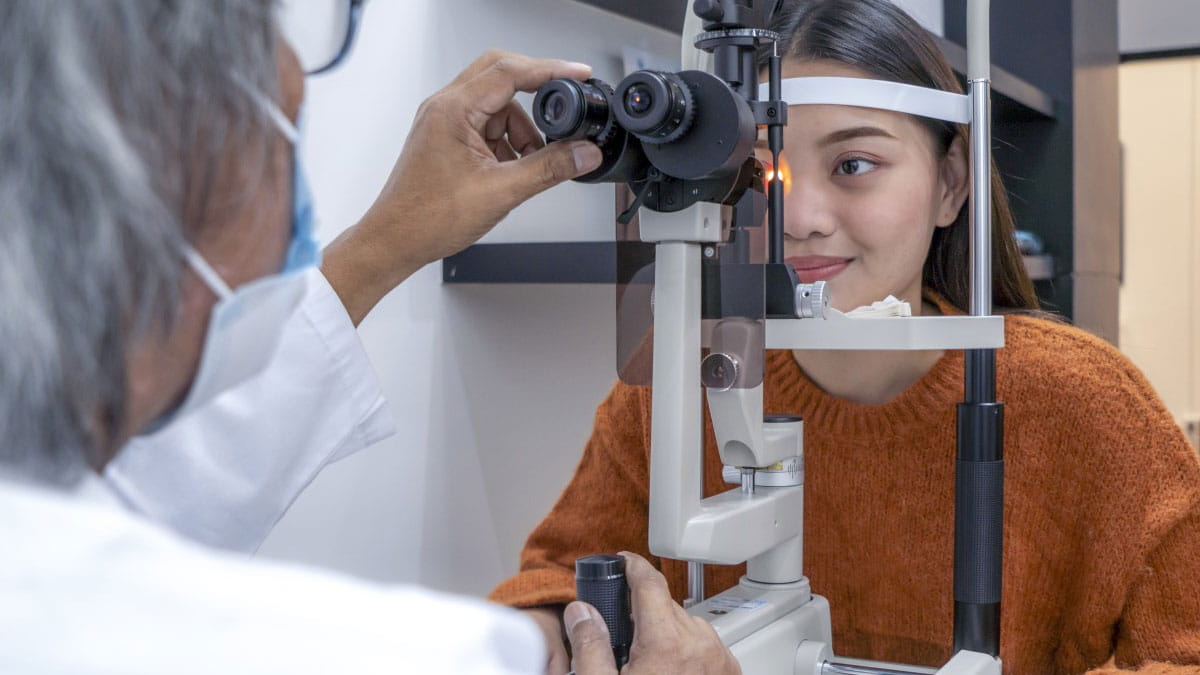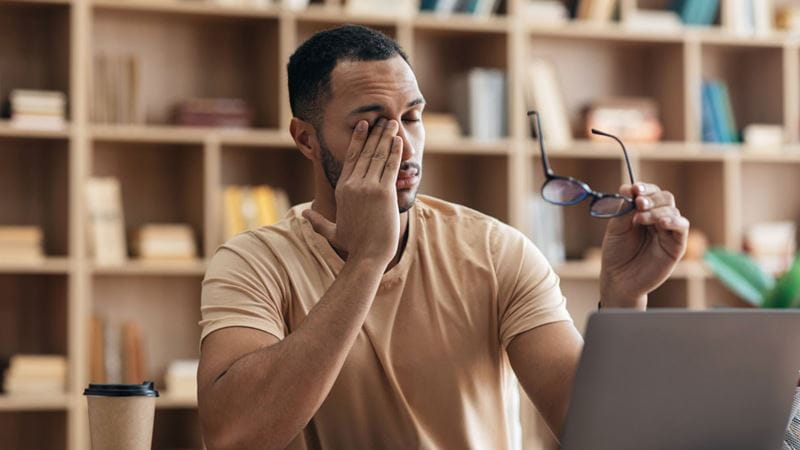Blog article
Understanding the importance of regular eye exams

In this blog, we’ll take a look at some of the reasons regular eye exams are crucial, including for the early detection of eye conditions like glaucoma and cataracts, monitoring eye health, updating prescriptions, and even identifying systemic diseases.
Plus, we’ll cover what to expect during an eye test, and how often you should be visiting your optometrist.
How do our eyes work?
Before we get into the necessity of regular eye exams, it's important to have a basic understanding of how our eyes works.
Light enters your eye through your cornea (the clear dome over your coloured iris) and then travels through your pupil (the black hole in the centre of your iris) and lens (which sits behind your pupil). Together, the cornea and lens focus the light onto your retina, a layer of nerve tissue that includes rods (which identify shapes and movement) and cones (which detect detail and colours)14.
Together, your rods and cones absorb light signals and change them into nerve impulses, which travel along your optic nerve to your brain. Your brain then recognises these nerve impulses as a visual image14. Pretty cool, right?
Why should I get regular eye tests?
- Early detection of eye conditions: Regular eye exams are essential in detecting various eye conditions and diseases in their early stages when they are most treatable1. Conditions such as glaucoma, cataracts, and macular degeneration often manifest without noticeable symptoms in the initial stages2,3,4. By undergoing routine eye examinations, you can catch any potential conditions early, preventing irreversible damage to your vision.
- Monitoring eye health: Just as it’s important to monitor our overall health through regular check-ups, it's important to monitor the health of our eyes. Eye exams provide an opportunity for optometrists and ophthalmologists to assess the overall health of the eyes, including checking for signs of infection5, inflammation6 (commonly referred to as uveitis), or other abnormalities1.
- Prescription updates: If you wear corrective lenses, whether glasses or contact lenses, regular eye exams are essential for ensuring your prescription is up to date. Vision can change over time due to various factors such as age, lifestyle, pregnancy or underlying health conditions7.
- Detection of systemic diseases: Eyes can provide valuable insights into overall health beyond just vision-related issues. During an eye exam, optometrists and ophthalmologists may identify signs of systemic diseases such as diabetes8, hypertension9, and even certain types of eye cancer10.
What happens during an eye test?
Eye tests are completely painless and typically take just 20 minutes to complete11. You’ll begin your test by answering questions about your general health, informing your optometrist of any family medical history, and, if you’ve brought your existing prescription and glasses1, a focimeter will be used to measure your current prescription12.
Types of eye tests you may undergo include:
- Visual acuity: While the name may sound fancy, this is just your regular old chart reading test. A visual acuity is used to check your ability to see details at different distances, which can indicate a need for glasses or contact lenses1.
- Retinoscopy: If your optometrist thinks you may need corrective lenses, they’ll then proceed with a retinoscopy, or refraction test. Your optometrist can use a manual refractor head or an autorefractor to measure the refractive error of your eyes1. If you’ve had an eye test in the past, this is the part when you’re required to look through a small machine at a piece of text or image while different strength lenses are passed over your eyes, and asked to decide which strength provides a clearer image.
- Peripheral vision: Peripheral vision refers to what you perceive through your side vision or "out of the corner of your eye." Diminished side vision could indicate the presence of glaucoma, making it an essential test1.
- Eye muscles: An optometrist may evaluate the function of your eye muscles through an examination of pupil responses and ocular motility, assessing coordination and movement, and response to light1.
- Front of eye: As mentioned previously, the front of your eye includes your cornea, lens and iris. An optometrist may shine a slit lamp into your eyes to check for any concerns, such as cataracts1.
- Ophthalmoscopy: The back of your eyes, which comprises the retina, blood vessels and optic nerve, is checked though a retinal test, or ophthalmoscopy, which involves the use of special drops to allow your optometrist to see your eyes better. This test can pick up problems such as macular degeneration1.
- Tonometry: A machine that blows a quick puff of air into your eyes, allows your optometrist to measure the pressure. This test can help diagnose glaucoma-1, which can cause irreversible blindness2.
- Optical Coherence Tomography (OCT): An advanced diagnostic equipment that captures detailed 3D scans of the back of the eye, including the optic nerve, retina, and macula an OCT test can help detect potential abnormalities, such as age-related macular degeneration, glaucoma, and diabetic eye disease13.
How often should I get my eyes tested?
Specsavers optometrist, Karen Walsh, says the best way to maintain optimum eyesight and health is through routine eye checks. Between age 40-60 she recommends having an eye check every two years. After 60 she recommends every year.
“With such equipment and increased knowledge, maintaining good eyesight and health is accessible to all.”
How much do eye test costs?
Medicare subsidises eye tests conducted by optometrists to all Australian citizens and permanent residents. If your optometrist directly bills the government on your behalf, you won't incur any charges (also known as bulk billing).
Under this arrangement, Medicare covers the cost of one eye test every three years for those under 65 and one eye test annually for individuals over 65. If your optometrist doesn't bulk bill, you can still claim some expenses by submitting a claim to Medicare.
It's important to note that Medicare doesn't cover the cost of glasses or contact lenses. However, if you have private health insurance, you may be eligible to claim on these items, depending on your level of cover.
1 Healthdirect - Eye tests
2 Healthdirect - Glaucoma
3Healthdirect - Cataracts
4 Healthdirect - Macular degeneration
5 Specsavers - What do I do if I get an eye infection?
6 Healthdirect - Uveitis
7 Specsavers - Do I need an eye test?
8 Optometry Australia - Why your optometrist may be first to diagnose diabetes
9 The Conversation - How your eyes could help diagnose high blood pressure
10 Cancer Research UK - Tests for eye cancer
11 Specsavers - How long should an eye test take?
12 Specsavers - Your store visit explained
13 Specsavers - What is OCT?
14 Healthdirect - Eyes
This article contains general information only and does not take into account the health, personal situation or needs of any person. In conjunction with your GP or treating health care professional, please consider whether the information is suitable for you and your personal circumstances.



